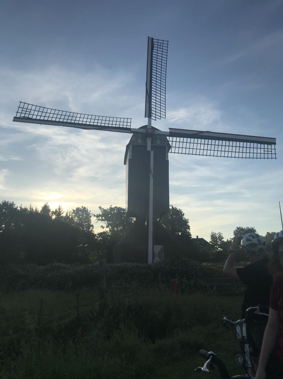By Elizabeth, Environmental Science; Sophomore
We started biking, pedaling toward the rising sun. The grass smelled fresh. Birds, or vogels in Dutch, were wide awake, their voices beckoned and echoed through the 6:30 am air. We biked by a huge windmill and enjoyed an impromptu photo moment. Some families in the Netherlands still run windmills. We headed to the ferry and could see the sun reflecting on the water. We left early so we didn’t have to be out in the heat.

We zoomed to the second ferry stop getting to appreciate the surrounding area. We were in the Biesbosch, a floodplain area that was discussed yesterday. Our tour guide Hugo had told us about various lines of defense used to prevent extreme flooding. The latest technique has been to develop floodplain zones where there is no development allowed. This area is a national park that serves as protected land for flood management, a habitat for various species, and a beautiful area for recreation. There were cormorants dotting the landscape near the edge of the marsh.

We got to the hostel early because we didn’t have a tour. As we ate lunch we discussed our thoughts on the course so far trying to recollect the main messages of the course. It was a great discussion; we built off each other’s ideas. Over the course we have been focusing first on the history of methods of water management for rivers. First the issue was the flooding of the sea until the later 1900s when rivers flooding drew attention inland. The approach to dealing with sea flooding was to build dikes. There was then a change of mindset, from wanting to fight against the water to deciding to live with the water. There was pressure to create a green infrastructure that would prevent flooding but also leave room for the river. It’s evident that the Dutch have a great sense of problem solving ability and use of space. Places have been reserved for emergency floodplains and there is strict zoning for cities, allowing for wide expanses of agricultural and natural areas.
It would be great if Americans could learn to cooperate; the difficulty is that there isn’t a shared central issue in the country. Dutch have a collective history and concern – water management.
It’s been a relaxing afternoon, getting to rest and canoeing. It was calming to be out on the water but difficult to adjust to going against the current. The marsh was beautiful. We enjoyed a lazy Sunday!
